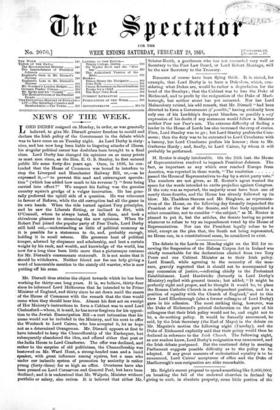NEWS OF THE WEEK.
LORD DERBY resigned on Monday, in order, as was generally believed, to give Mr. Disraeli greater freedom to mould and declare the Irish policy of the Government in the debate which was to have come on on Tuesday night. As Lord Derby is sixty- nine, and has now long been liable to lingering attacks of illness, his singular political career has doubtless been brought to a final close. Lord Derby has changed his opinions on as many points as most men since, as the Hon. E. G. S. Stanley, he first entered public life some forty-five years ago. Once, in 1826, he con- tended that the House of Commons was bound to interfere to stop the Liverpool and Manchester Railway Bill, or,—as he expressed it,—" to prevent this mad and extravagant specula- tion" (which has added how much to his revenue ?) " from being carried into effect ?" We suspect his feeling was the genuine country squire's grudge of a vulgar innovation. He has gene- rally preferred the uphill aide of a question. He was vehement in favour of Reform, while the old corruption had all the game in its own hands. When the tide turned against Tory principles, and he saw the Liberals flirting, or inclined to flirt, with O'Connell, whom he always hated, he left them, and took a chivalrous pleasure in stemming the new opinions. When Sir Robert Peel joined the popular party of Free Trade, Lord Derby still held out,—understanding as little of political economy as it is possible for a statesman to do, and, probably enough, holding it in small esteem. His generous heat of political temper, adorned by eloquence and scholarship, and lent a certain weight by his rank, and wealth, and knowledge of the world, has now for a long time been little more than a picturesque costume for Mr. Disraeli's consummate statecraft. It is not amiss that it should be withdrawn. Neither friend nor foe can help giving a word of honourable mention to the stately old warrior, who is now putting off his arms.






























